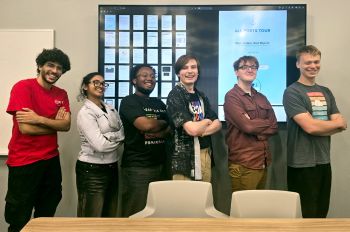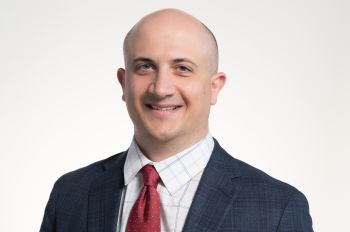Professor Emerita Martha Evens Receives Lifetime Achievement Award for work in Computational Linguistics

Martha Evens, professor emerita of computer science at Illinois Institute of Technology, dedicated her career to pushing the boundaries of natural language processing and to mentoring new generations of computer scientists and computational linguists. That dedication was feted by the Association for Computational Linguistics (ACL) with its Lifetime Achievement Award in May 2022.
The award is bestowed on those whose work is widely recognized as providing sustained and enduring contributions to the field of computational linguistics over a long period. It is not awarded every year.
The award was bestowed upon Evens during the ACL’s 60th annual meeting in Dublin on May 25, 2022. Evens says she was taken completely by surprise when she received the news that she would be this year’s Life Time Achievement Award winner.
“I was so delighted,” she says. “I never thought this would happen, especially now since I’ve been out of research for so long.”
The ACL described the 87-year-old Evens as a “path blazer” in the fields of lexical databases and intelligent tutoring systems for medical students. She has authored more than 300 publications, and served as an adviser or co-adviser to more than 100 Ph.D. students at Illinois Tech.
“Everything she did, she did with intelligence, grace, humility, and for the greater good—truly an example to us all,” said Tim Baldwin, president of the ACL, during the presentation.
ACL Fellow Martha Palmer described Evens during the awards presentation as “a sterling example of what it means to dedicate your life to your teaching and to your students,” stating that despite her impressive research accomplishments and leadership roles, “She [always] stayed focused on how best to teach and serve her students and the community.”
“Martha is truly one of a kind,” says Shlomo Argamon, chair of the Illinois Tech Department of Computer Science. “It’s rare to find a researcher who has made significant contributions in so many areas of computer science. It’s rare to find a mentor who has graduated more than a hundred doctoral students. It’s rare to find a scholar and teacher who is vigorously active well into their seventh decade. But someone who is all of that and above all, humble, compassionate, and unstintingly devoted to the welfare of those around her? That is Martha, and that is what we should all aspire to be.”
Evens’ work on CIRCSIM-Tutor, an intelligent tutoring system developed to help first-year cardiovascular physiology students at Rush University, was cited by the ACL as an example of her pioneering work. It was based on CIRCSIM, a tutoring routine developed by Rush faculty to help students diagnose heart conditions. The computational system was developed by a team of accumulated researchers, and the system allowed small groups of students to ask questions through the computer and get the answers that they were seeking.
“We tested it with real students, and they were willing to talk to us about their experience with it, so we could develop it further, correct bugs, and add vocabulary and further plans.” Evens says.
Evens said she kept late office hours, which were used by many part-time graduate students in the department who were working professionals in the computer science fields. These talks helped her to stay knowledgeable about the field and told her what professionals in the field were doing. “There were always a number of good computer scientists in Chicagoland,” she said. “I learned a lot from them about work that was going on locally.”
“It was fun to work with students who were eager to learn something new. I think everyone in the department enjoyed the enthusiasm of the students and their willingness to do hard work.”
Evens says that her introduction to natural language processing came as a mathematics student in the M.S. program at Harvard University.
“I came home from a year in Paris in the summer of 1956 and was admitted to the graduate program at Harvard,” Evens says. “The first time I went to the building housing the mathematics department, I met Leonard Evens, who was sitting on the front steps. He had volunteered to meet the new students and show us around. As we got to
know each other during the first semester, he suggested that I apply for a summer job at [Massachusetts Institute of Technology’s Lincoln Laboratory]. He said he had worked there the summer before and learned a lot.”
“He was planning to go to work there again the next summer,” Evens continued. “We married in 1958. I had the great good luck to be hired by Oliver Selfridge, a major figure in early natural language processing, who assigned me to learn to program in Fortran and write a spelling correction program.”
Evens later earned her Ph.D. in computer science at Northwestern University, beginning part-time when her youngest child started school in 1969. A week after defending her thesis in 1975, she joined the faculty at Illinois Tech’s Department of Computer Science as its first member to hold a Ph.D. in computer science.
She conducted research primarily in natural language processing, and was instrumental in writing two books on lexical databases. She wrote a book with Joel Michael published in 2006 about CIRCSIM-Tutor. She also explored other areas of computer science, and taught nearly every computer science course offered at Illinois Tech.
She served as an associate editor for Computational Linguistics (then the American Journal of Computational Linguistics) from 1981–1984, and served as the president of ACL in 1984. She served on the editorial board of the Cambridge University Press series, Studies in Natural Language Processing, from 1982–1990, and served on the planning committee and later the Board of Directors for the American Federation of Information Processing from 1983–1990. She worked with SIGLEX on the Organizing Committee and as a board member from 1992–2004.
Photo: Professor Emerita of Computer Science Martha Evens at the Department of Computer Science’s 50th anniversary celebration in October 2021 (Bonnie Robinson)




